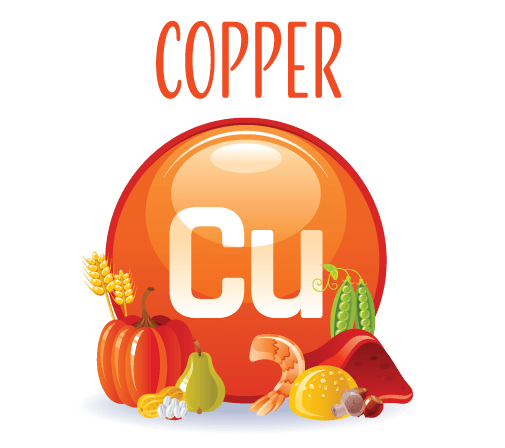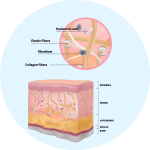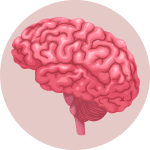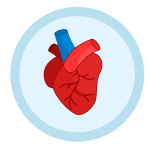
Uncovering the Importance of Copper: Why This Overlooked Mineral is Essential to Your Health
Copper is an essential trace element in our body, and it plays a vital role in various physiological processes. It is necessary for energy production, hormone formation, and the growth of connective tissue and bones. Most importantly, it is a crucial component of many enzymes that act as antioxidants, protecting our cells from harmful free radicals.
Our liver stores the majority of copper in the body, but traces of it are found in all tissues. The liver eliminates excess through bile, making it an important organ for copper regulation. A deficiency can lead to various health problems.
Unfortunately, copper deficiency is prevalent in many populations worldwide, often due to inadequate dietary intake or malabsorption issues. Therefore, it is essential to incorporate copper-rich foods into your diet.
Why is copper essential for our body?

Blood Cells
It is necessary for the creation of enzymes that are involved in the formation of red blood cells. These enzymes help to activate genes that are responsible for creating hemoglobin, the protein that allows red blood cells to carry oxygen.

Iron Assist
Copper helps to activate ceruloplasmin, a protein that aids in the transportation of iron throughout the body. It is also required to help regulate iron levels in the body, which is another important component of red blood cells.

Skin
One of its important functions is its involvement in the production of elastin and collagen, two essential proteins found in connective tissue. Copper acts as a cross-linking agent for these proteins, helping to strengthen and stabilize their structures.

Brain Health
Copper plays a crucial role in the maintenance of brain cells and the formation of neuronal connections.

Mood and Behavior
It works alongside other minerals such as zinc and iron in synthesizing neurotransmitters like dopamine, norepinephrine, and epinephrine. These neurotransmitters are essential for regulating mood and behavior, and any imbalance can lead to mood disorders like depression and anxiety.

Heart HEalth
Recent research has found that low copper levels in the body can also lead to high cholesterol and high blood pressure.
Deficiency
A deficiency is rare among healthy people. Even a mild deficiency can significantly impair the body’s normal functions. It can be determined through a simple blood test, urine sample, or hair analysis.
The consuming high amounts of fructose can significantly worsen deficiency.
The most common causes
- Deficiencies are found in babies fed only soy milk.
- Inadequate dietary intake
- Malabsorption due to gastrointestinal disorders
- Premature infants
- Recovering from severe malnutrition
- Celiac Disease
- Crohns Disease
- Cystic Fibrosis
- Sprue
Symptoms of copper deficiency

Heart HEalth
Copper deficiency causes bleeding under the skin due to lack of collagen formation, leading to fragile blood vessels and damage that can result in organ damage, including an enlarged heart.

Brain Health
Our brains require a small amount of copper to function properly. It helps to regulate the production of neurotransmitters, the chemicals that transmit messages between our brain cells. When copper levels are low, our brain function can be affected, leading to the development of neurodegenerative diseases.It

Bone Health
Copper deficiency can lead to osteoporosis, making bones fragile and prone to fractures. It is also important for collagen production, which helps connective tissues like bones and joints.

Affect on skin
When the body lacks copper, the production of melanin is affected. This results in a decrease in pigmentation in the skin, causing blotchy or light-colored patches. Also affects collagen synthesis, which leads to slow wound healing, reduced skin elasticity, and an increased tendency to form stretch marks and sagging skin.

hypochromic anemia
When the body does not have enough copper, it can lead to a decrease in the amount of hemoglobin in the blood, resulting in hypochromic anemia

Fatigue
Without adequate copper levels, the body cannot produce enough ATP, which results in fatigue, weakness, and lethargy.
Wilsons Disease
While copper is beneficial in proper amounts, an excess of it can also be harmful, leading to a condition called Wilson's disease.
Wilson’s disease is a rare hereditary disorder that affects the body’s ability to excrete copper. Instead, the excess accumulates in the liver, causing damage and eventually releasing copper directly into the bloodstream. The copper then travels to other organs, including the brain and eyes, where it also accumulates and causes damage. Symptoms usually begin after age 5 and can include tremors, difficulty speaking and swallowing, incoordination, involuntary jerky movements, personality changes, and even psychosis. Doctors diagnose Wilson’s disease through blood tests and liver biopsy and treat it with drugs that bind to copper, such as penicillamine, and zinc supplements that decrease copper absorption. If left untreated, Wilson’s disease is fatal, and liver transplantation can cure the disease. It is crucial for people with Wilson’s disease to follow their treatment regimen strictly to prevent liver failure and ensure a good quality of life.
Copper, Vitamin C & Zinc work together to form elastin.
The level of copper in the body is related to the amount of Vitamin C and Zinc in the body.



